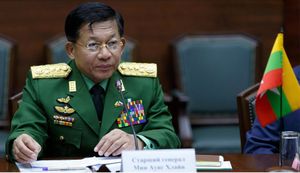Russian missile strikes targeted the historic center of Odesa, Ukraine, on the evening of January 31, 2025, marking yet another assault on the country's cultural heritage during the continuing war with Russia.
At least seven people were injured as the strikes hit several civilian buildings, including the five-star Bristol Hotel, a notable architectural landmark built at the end of the 19th century, and the nearby Odesa Philharmonic concert hall. The Odesa regional governor, Oleh Kiper, reported multiple explosions and described the attack as part of Russia's strategy to inflict damage on key Ukrainian sites.
President Volodymyr Zelensky condemned the attack, stating during a press briefing, "The strikes are directly targeting the city, hitting ordinary civilian buildings. Again and again: Air defense systems are the first priority." His words encapsulated the urgency for improved military support as attacks on urban centers increase.
Eyewitness accounts and videos shared on social media showed the extensive damage to the Bristol Hotel's lobby, with debris littering the surrounding streets, and shattered windows at historical venues nearby. "Fortunately, no fatalities were reported. Some people were wounded and have received assistance," Zelensky added, underscoring the need for effective recovery efforts following the chaos.
Norwegian diplomats were present in the area during the missile attack, according to Andreas Bjørklund from Norway’s Ministry of Foreign Affairs, who confirmed their safety post-attack. "We can confirm there has been a major attack in Odesa... Norwegian diplomatic representatives were in the blast epicenter," he stated to NRK. This detail highlights the international stakes of the conflict, attracting global attention to the human costs involved.
The attack on Odesa’s historic district, which only recently received designation as a UNESCO World Heritage Site, raised alarms not just locally but globally. The area has been recognized for its cultural significance, with officials emphasizing its role as part of Ukraine's national heritage. The threat of such strikes symbolizes efforts to erode Ukrainian identity amid warfare.
Governor Kiper remarked on the unusual method of the assault. "This means it was deliberately aimed at a civilian hotel to destroy the floors and structures inside," he expressed. His comments conveyed the notion of targeting civilians rather than military operations, illustrating the harsh reality civilians continue to face.
Previous attacks, including one in July 2024 on Odesa, had already damaged over twenty architectural monuments, pulling Odesa toward the forefront of artistic and historical loss during wartime. Local leaders and cultural advocates raised concerns about the repercussions on tourism and cultural pride.
Zelensky’s administration is now calling for urgent international help to strengthen Ukraine’s air defense capabilities, which he articulated during his nightly address: "We need faster deliveries and greater numbers of systems and weapons which will enable us to save the lives of more of our soldiers, our people." His plea highlights the continuous need for tangible military support, as the current conflict appears to be taking increasingly dire forms.
The potential for new attacks remains high as Russian forces aim to regain momentum after months of military stagnation. Strikes like the ones seen on January 31 serve not only as tactical operations but act as psychological warfare against the Ukrainian populace as well.
The attack on Odesa serves as another reminder of the human and cultural toll of war. Witnesses recounted the rapid escalation from relative calm to chaos, as news of the strikes spread through the city. Emergency services quickly arrived on the scene to assist the injured and assess the damage.
Looking forward, the international community watches closely how this incident may affect diplomatic relations and the strategic calculus by both Russia and Ukraine. With the stakes continually being raised, cultural locations such as Odesa now stand symbolically at ground zero within this enduring geopolitical conflict.



